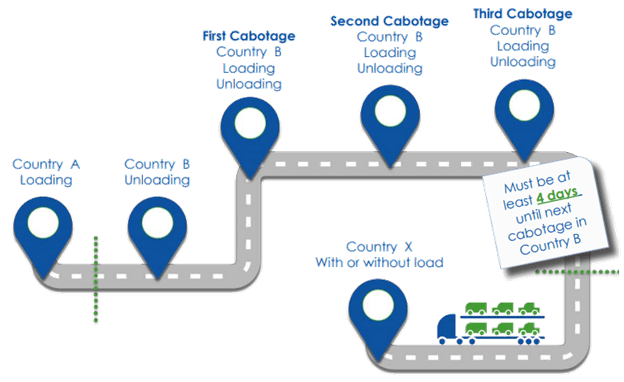Written by: Irem Donmez Bahar
SmartRouting | 5 mins read
– The most prominent restrictions in route planning puzzle are listed as order due dates, requested time intervals, vehicle capacities, product specific constraints and driver related rules. But for sure they are not the only ones in creation of a daily route plan. In this blog post we focus on so-called ‘cabotage rules’ which are critical for international road transport companies. Cabotage rules increase complexity of the puzzle a lot and are linked to potential heavy penalties but also opportunities.
Cabotage rules
Cabotage rules are very complex, too complex for the human brain to comply with on every occasion, and the importance of complying gets increasingly bigger.What is a cabotage operation?
A cabotage operation is the transport of goods within the same country by a transport company registered in another EU country. It is required to execute a loaded international transport preceding cabotage operations.
Regulation (EU) 2020/1055 was published in the Official Journal on 31 July 2020 and provides a legal framework for posting rules applicable to cabotage and international transport operations. These amendments have become effective on the 21st of February 2022.
What are these cabotage rules?
Below I listed the main cabotage rules which need to be taken into account by route planners in the creation of an international route plan within Europe. It is important to notice that there are changes entered into force on the 21st of February 2022 which are included in the list below.
- Cabotage operation must be executed following an international transport operation (i.e. cross border transport) with an origin of another Member State or a third country.
- The international transport preceding cabotage operation has to be loaded transport which means that it is not possible to transport empty trucks to execute cabotage operations in a Member State.
- Up to 3 cabotage operations following an international carriage can be performed, within a maximum of 7 days.
- A cabotage operation can in principle include multiple loading and unloading points. Each Member State can put individual restrictions on this point.
- When the last permitted cabotage operation has been finished, the truck is not allowed to be used for any cabotage operation for 4 days (i.e. cooling off period) in that Member State.
- The cooling period is counted individually for each host Member State which means the truck is allowed to perform cabotage operation in another Member State while it is in the cooling off period in the Member State it executed its previous cabotage operations.
- While it is forbidden to execute cabotage operations during the cooling period in that Member State, cross-border transport through the Member State where cabotage operation was executed is allowed.
- At most one cabotage operation can be executed in a Member State which is not the destination of the incoming international transport operation.
- There are further details in the calculation of the cooling period and also in the calculation of the period of 7 days in case, the last day of the period is a public holiday, Sunday or a Saturday.

Source image: https://transport.ec.europa.eu/transport-modes/road/mobility-package-i/market-rules/rules-cabotage-applicable-21-february-2022_nl
Why it is interesting?
Cabotage rules are important for all international transport companies in the EU. There are heavy fines in case of infringement of the rules.
Even for experienced planners, these rules are hard to consider in daily route planning. Firstly they are complex business rules; depending on the combination of deliveries with time restrictions. For example, newly added cooling-off period calculations are too complex to take into account in your solution on top of all other business rules.
Secondly, there are ongoing discussions about cabotage rules. As we indicated, the latest changes are in effect since February 2022. On account of Brexit, cabotage rules no longer apply in the UK. Due to driver shortage, the UK removed cabotage restrictions on deliveries. At the date of this writing foreign drivers is able to take 6 months’ temporary visa. Once they deliver a load in the UK, then they can execute unlimited UK cabotage operations within 14 day period. Once the driver shortage is resolved and pressure on supply chains is relaxed, it is expected that rules in the UK will be back in force.
On top of this complexity and dynamism, cabotage operations are also subject to additional national legislation. For example last year Sweden increased penalties for unauthorized cabotage operations and put more responsibility on the customer side. Restrictions related to maximum weight and dimension of vehicles also vary in each Member State. Similarly, requirements based on products transported or driver resting times can be different in each Member State.
It is the responsibility of each Member state to control the adherence to the Cabotage rules and this is treated differently from country to country. Some countries increase the raid alongside the highways, other countries introduce additional checkpoints at the borders and again others ask the international transport companies to guarantee adherence to the rules. Since breaching the Cabotage rules are connected with high penalties for the transportation company, it is critical for the companies to register all transport orders and routes to present proof of not breaching the cabotage rules.
Cabotage rules
So the question is: how do you as a company make maximum use of the flexibility in these rules and still comply legally?How can you comply with these rules with SmartRouting?
As clear as day these rules are overly complex, too complex for the human brain to comply with on every occasion, and the importance of complying gets increasingly bigger. So the question is: how do you as a company make maximum use of the flexibility in these rules and still comply legally?
SmartRouting can support you in this regard. Cabotage rules can be taken into account by our SmartRouting solution in route creation. Planners can easily maintain the rules with regard to changes. Cabotage rules and additional national restrictions can be entered in a format that is easy to use for any planner. It is also possible to enter validity for the rules so that transport companies do not have the risk of creating plans with unauthorized cabotage operations.
Knowing that more responsibility is put on the customer side related to unauthorized cabotage operations in Sweden, it is important that international transport companies communicate their capabilities in planning including cabotage operations. SmartRouting includes powerful reporting tools that can show transports in relation to the Cabotage rules.
Last but not least SmartRouting allows your planners to create a route plan making the maximum allowed the use of the valid cabotage rules, restricting empty transport and CO2 emissions.
More information
For the details of the functionalities of the SmartRouting solution, please have a look at our Solution Sheet. For more information, contact us with any questions you may have.
Irem Donmez Bahar is an internationally experienced Supply Chain Management / Business Consultant and has been working for Ab Ovo for more than 3 years. In 2015 she got her professional doctorate in engineering (PDEng) from TU/e focusing on collaboration in the supply chain. She has expertise in SC planning and process design and enjoys supporting customers in an array of industries to solve their various complex planning puzzles.


